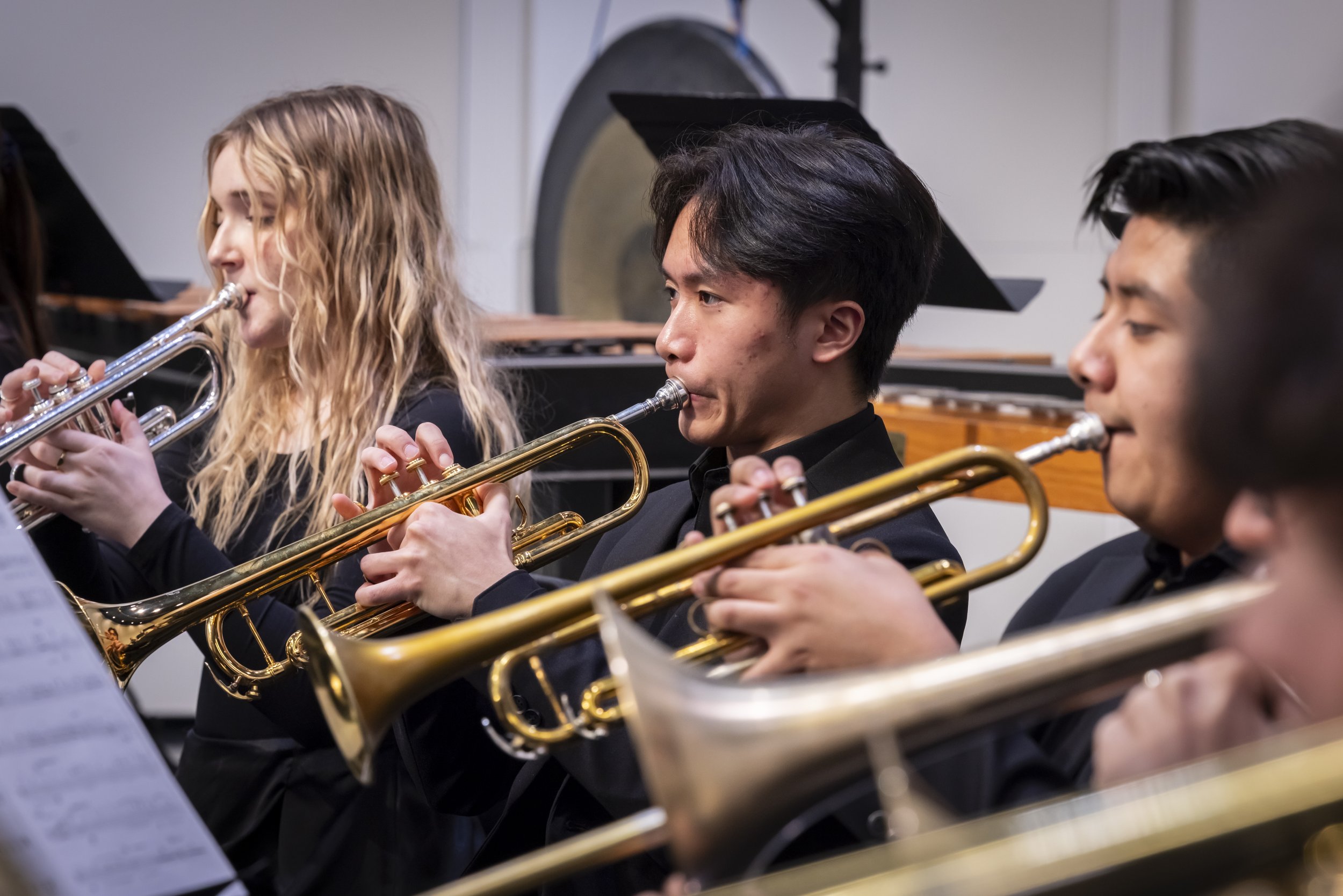Interlochen Premieres a New Work by Chen Yi
Written by Julian Jimenez-Pardo
Interlochen Center for the Arts presented an exciting night of music on April 18. The concert included the world premiere of a newly composed piece by renowned composer Chen Yi in collaboration with Juilliard Pre College and a performance of “Mothership” by Mason Bates. It showcased Interlochen’s continued emphasis on new, innovative music and provided a unique opportunity for students to work with a living composer.
Chen Yi is a Chinese-American composer known for fusing East and West in her unique and powerful music. Born in China but now residing in the U.S., her resume includes an impressive roster of well-known compositions and awards. Her latest work for orchestra received its first performance here at Interlochen.
What set this experience apart is that Chen Yi was present on campus in the lead-up to the concert, interacting with students firsthand and observing rehearsals. It was an extraordinary opportunity for young musicians to meet a composer and assist with creating the piece’s first-ever performance.
The Interlochen Times spoke with conductor Dr. Leslie Dunner to get some insight into what goes into a premiere like this, and how exactly “Mothership” fit into the evening.
Q: What’s it like preparing a world premiere?
A: The most important part is analyzing what’s on the written page and interpreting it as clearly as possible. Then, in rehearsal, you listen and see if what’s written actually works for the players. Sometimes it doesn’t translate well—for instance, we had a piccolo part at the start of the third movement that was very high. The player came to me, we talked to the composer about possibly shifting it down an octave, and she approved it. But ultimately, the player decided to keep it as written and just work on it. So part of preparing a premiere is anticipating these issues and working through them collaboratively.
Q: How would you describe Chen Yi’s music?
A: I would describe it as in a contemporary style—clearly written by someone who studied in a conservatory. It uses a lot of dissonance and rhythms that are very disjunct. But what this composer did was infuse that style with elements of Chinese culture from the north and south, from the perspective of a child. It’s really a blending of technical and cultural expression.
Q: How do you go about preparing this many concertos in such a short amount of time?
A: It’s definitely a challenge, especially since many of the students playing solos have never played concertos with an orchestra before—only with piano. And that’s a very different experience. A pianist can adjust more easily, but an orchestra is a much larger organism. As the conductor, I have to feel and breathe the music and then try to align my interpretation with what the soloist is doing. Sometimes the soloist has to adjust to the orchestra, and sometimes the orchestra adjusts to the soloist. It’s really like a duet or a partnership in a dance. When it starts to work, that’s the fun part.
Q: What about “Mothership”—how does it pair with Chen Yi’s piece?
A: “Mothership” was picked as a total contrast. We had a range in the program—from Chen Yi to Handel with voice, to a marimba concerto and a piano concerto—and we needed something to “set the concert on fire” at the end without overshadowing the others. It’s a 21st-century piece with a computerized part. Once the orchestra heard that tech component, they played differently—they got it. We even added lighting effects, including LED finger lights, and I added a rocket launch sound at the end that’s not originally in the score. It really capped off the night in a surprising, exciting way that no one expected from what looked like a traditional concert.
Since Chen Yi’s work was brand new, there were no previous recordings to rely upon. Students and faculty alike started from the ground up, collectively doing their part to bring the score to life. Having the composer present allowed people to ask questions, receive feedback, and try different things.
Written by composer and performing artist Mason Bates, “Mothership” blends classical instruments with electronics for a sound that’s unique to the traditional orchestra stage. The work featured various soloists, including a jazz combo in addition to several dancers who interpreted the piece. High energy, fun, and great for displaying the range of the orchestra, “Mothership” was an excellent complement to the traditional, expressive music by Chen Yi, leaving us with an exciting and contrasting program for the night.
In addition to the featured works by Chen Yi and Mason Bates, the concert also showcased the winners of Interlochen’s annual concerto competition. This year’s soloists included Joanna Wilson, performing “Cara sposa” from Rinaldo by George Frideric Handel; William Tao, performing the second movement of Emmanuel Séjourné’s Concerto for Marimba and Strings; and Mia Safdie, performing the first movement of Mozart’s Piano Concerto No. 20 in D minor, K. 466. Their performances highlighted the depth of talent among Interlochen’s young musicians and added a soloistic element to the evening’s program.
Interlochen’s April 18 performance was not just another show; it was a big step for Interlochen in the new music world and an opportunity to hear something that no one else had heard before. Whether you enjoy orchestral music, new sounds, or just want to hear something completely different, this was an event to remember. Admission to the concert was free, allowing the public to support our talented students and catch a glimpse of the skill and artistry of our concerto competition winners.

